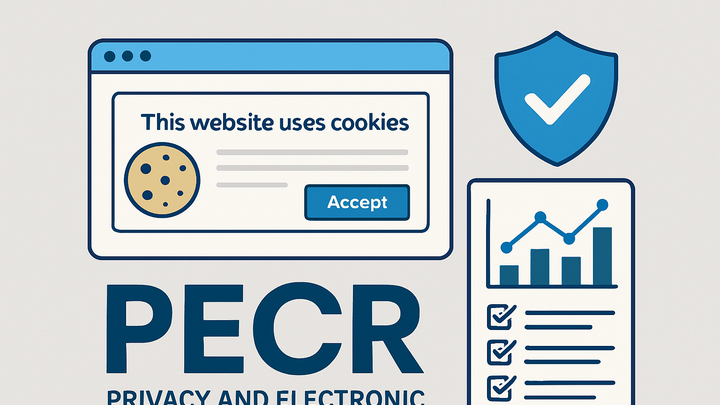Published on 2025-06-22T04:22:53Z
What is PECR (Privacy and Electronic Communications Regulations)?
The Privacy and Electronic Communications Regulations (PECR) are a UK legislative framework that governs privacy in electronic communications. They implement the EU ePrivacy Directive in the UK, focusing on confidentiality of communications, security of networks, rules on cookies, and restrictions on unsolicited marketing by email, text, and automated calls. Introduced in 2003 and updated periodically, PECR sits alongside the UK GDPR, ensuring that organisations handle personal data in electronic communications responsibly and transparently. For analytics teams, PECR requires that cookies and similar technologies only be deployed with user consent, except for strictly necessary cookies. Solutions like Google Analytics 4 must be configured to respect consent requirements, while cookie-free tools like PlainSignal provide alternatives that minimize regulatory burden. Compliance with PECR involves implementing consent management platforms, conducting regular cookie audits, and maintaining clear privacy policies.
Pecr (privacy and electronic communications regulations)
UK regulation requiring consent for cookies, electronic marketing, and communication security, complementing GDPR.
Overview of PECR
The Privacy and Electronic Communications Regulations (PECR) establish rules for privacy in electronic communications within the UK. They implement the EU’s ePrivacy Directive, focusing on confidentiality of communications, security, and marketing regulations. Originally enacted in 2003, PECR works alongside UK GDPR to ensure organizations handle personal data and electronic communications responsibly.
-
Scope
PECR applies to organizations that provide publicly available electronic communications services in the UK, including ISPs, telecoms providers, and online businesses using cookies or sending electronic marketing.
-
Geographic scope
Applies to entities processing data of UK residents or operating within the UK.
-
Regulated entities
Includes providers of networks, telecom services, websites using cookies, and marketers sending emails or texts.
-
-
Purpose
PECR complements data protection laws by setting specific requirements for privacy in electronic communications, cookies, and unsolicited marketing. It aims to protect users from intrusive tracking and unwanted communications.
Key Provisions of PECR
PECR covers several critical areas: rules on cookies and similar technologies, confidentiality of communications, and restrictions on unsolicited marketing messages.
-
Cookies and similar technologies
Organisations must obtain user consent before storing or accessing information on their devices using cookies or similar technologies, except for cookies strictly necessary to provide a service.
-
Prior consent
Consent must be informed, specific, freely given and can be withdrawn.
-
Exemptions
Functional cookies essential for website operation are exempt from consent requirements.
-
-
Unsolicited electronic marketing
PECR prohibits the sending of unsolicited marketing emails, texts, or automated calls without prior consent from the recipient.
-
Soft opt-in
Existing customer marketing is allowed if they’ve opted in or purchased similar products and given an easy opt-out.
-
-
Security of communications
Communication service providers must ensure the security and confidentiality of communications, protecting against unauthorized access and misuse.
Impact on Web Analytics
PECR’s requirements directly impact how analytics tools operate, particularly regarding cookies and user consent. Different analytics solutions take varied approaches to compliance.
-
Google analytics 4 (GA4)
GA4 uses cookies and unique identifiers to track user behavior across sessions, requiring explicit consent under PECR. Organizations can configure IP anonymization and consent mode to reduce privacy risks.
-
Ip anonymization
Masks user IP addresses before storage to minimize personal data collection.
-
Consent mode
Allows GA4 scripts to adjust behavior based on users’ consent status, delaying or disabling cookies until consent is granted.
-
-
PlainSignal (cookie-free analytics)
PlainSignal is a GDPR and PECR-compliant analytics tool that does not use cookies or local storage, relying instead on aggregate data and privacy-preserving techniques.
-
Example tracking code
<link rel="preconnect" href="//eu.plainsignal.com/" crossorigin /> <script defer data-do="yourwebsitedomain.com" data-id="0GQV1xmtzQQ" data-api="//eu.plainsignal.com" src="//cdn.plainsignal.com/plainsignal-min.js"></script> -
No consent required
Since it collects only non-personal aggregate metrics, prior consent under PECR is not necessary.
-
-
Consent management platforms (cmps)
CMPs facilitate capturing, storing, and managing user consents for cookies and tracking, ensuring compliance with PECR and GDPR.
Implementing PECR Compliance
Ensuring adherence to PECR involves combining legal strategies and technical solutions, from consent collection to ongoing audits.
-
Consent collection
Use clear, unambiguous consent banners or pop-ups to obtain user permission before setting non-essential cookies.
-
Design best practices
Banners should explain cookie purposes, avoid pre-ticked boxes, and allow easy withdrawal.
-
-
Technical implementation
Implement script blocking using tag managers or custom code to prevent loading analytics or marketing scripts until consent is granted.
-
Tag management
Configure Google Tag Manager or similar tools to fire tags based on consent variables.
-
Regular audits
Periodically audit cookies and tracking scripts to ensure only compliant technologies are active.
-
-
Policies and record-keeping
Maintain detailed records of consents, cookie audits, and privacy policy updates to demonstrate compliance.
